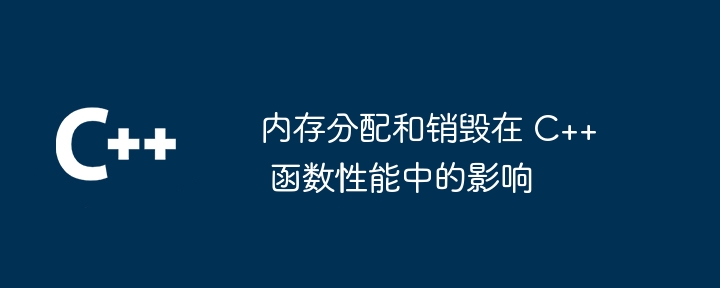Home >Backend Development >C++ >The impact of memory allocation and destruction on C++ function performance
The impact of memory allocation and destruction on C++ function performance
- PHPzOriginal
- 2024-04-22 22:33:02661browse
Memory allocation and destruction significantly affects C function performance. Stack allocation is faster and supports automatic release; heap allocation supports dynamic resizing, but the overhead is greater. When freeing memory, destructors and delete are used to destroy objects and free heap memory. Optimization recommendations include prioritizing stack allocations, using heap allocations only when necessary, freeing heap memory correctly, and using memory detection tools to find leaks.

The impact of memory allocation and destruction on C function performance
In C, memory management is the key to affecting function performance One of the factors. Improper allocation and destruction operations can lead to performance bottlenecks and memory leaks.
Memory Allocation
Memory allocation occurs when a new data structure needs to be created within a function. There are two main allocation methods:
- Heap allocation (new): Allocates memory from the heap and needs to be explicitly released.
- Stack allocation (variable declaration): Allocate memory from the stack and automatically release it when the variable goes out of scope.
Stack allocation is faster, but dynamic resizing is not supported. Heap allocations can be resized dynamically, but are more expensive.
Practical case: stack allocation and heap allocation
// 栈分配
void stack_allocation() {
int array[100000];
// 使用数组
}
// 堆分配
void heap_allocation() {
int* array = new int[100000];
// 使用数组
delete[] array; // 显式释放内存
}In stack allocation, array cannot be resized once created. In heap allocation, we can use new and delete to dynamically adjust the size of the array.
Memory Destruction
When memory is no longer needed, it must be destroyed to release resources. Not destroying heap-allocated memory can lead to memory leaks.
- Destructor: Release the memory associated with the object in the destructor.
- delete and delete[]: Explicitly release the memory allocated by the heap.
Practical case: destructor and delete
class MyObject {
public:
~MyObject() { delete[] data; } // 析构函数释放 data 指针
int* data;
};
void function() {
MyObject* obj = new MyObject();
// 使用 obj
delete obj; // 显式释放对象
}Optimization suggestions
- Use the stack first distribute.
- Use heap allocation only when needed.
- Use destructors and
deleteto properly free heap allocated memory. - Use memory detection tools regularly to find memory leaks.
The above is the detailed content of The impact of memory allocation and destruction on C++ function performance. For more information, please follow other related articles on the PHP Chinese website!

